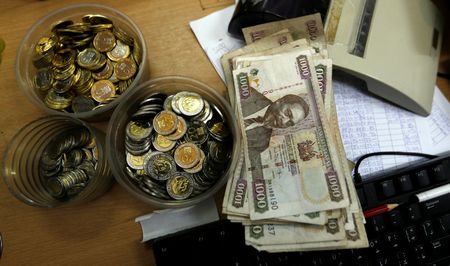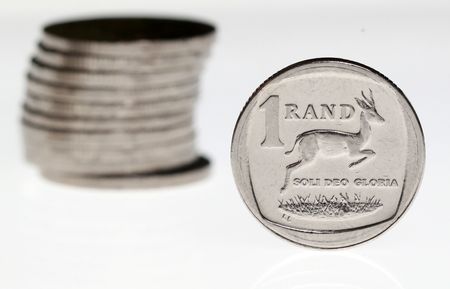By Rae Wee and Alun John
SINGAPORE/LONDON (Reuters) -The dollar struggled on Tuesday as investors began to grow itchy about hoped-for U.S. trade deals, while Asian currencies took a breather after an unprecedented two-day surge that highlighted the fragility of the greenback.
The dollar was last down 0.5% on the Japanese yen at 142.99, and also lost ground versus European currencies with the euro and pound both up 0.2% at $1.1341 and $1.3328 respectively.
“What’s clear this morning is some of the optimism we had last week around trade deals has faded,” said Jane Foley, head of FX strategy at Rabobank.
She said the market would soon “get impatient” and start to pay more attention to the warnings from companies about the damage to the world economy from tariffs.
In recent weeks investors had been growing more optimistic that the U.S. would reach deals that pare back tariff levels, optimism that has been helping support shares and the U.S. dollar.
Currency traders were also still processing recent moves in emerging Asian currencies, though the unprecedented two-day rise in the Taiwan dollar eased on Tuesday.
Other currencies in emerging Asia have risen too, sounding a warning for the dollar because they suggest money is moving into the region at scale and that a key pillar of dollar support is wobbling.
“The factor many talk about is whether these countries with historically ‘weak’ and heavily managed currencies now appealing to Trump through the currency channels are now allowing for an appreciation of the currency as part of the trade negotiations,” said Chris Weston, head of research at Pepperstone.
Such a deal has been repeatedly denied by Taiwan’s central bank, but the market is not entirely convinced and sees the Taiwan dollar’s jump as having its tacit approval, as well as likely being welcomed by the United States.
The onshore yuan was 0.7% higher at 7.2212 per dollar following the reopening of trade after an extended break, while its offshore counterpart strayed not too far from a six-month high at 7.2135.[CNY/]
Elsewhere, the euro appeared unfazed after conservative leader Friedrich Merz in Germany failed to win parliamentary backing to become chancellor, in an unexpected setback for his new coalition with the centre-left Social Democrats.
The next major scheduled development for currency markets is Wednesday’s Federal Reserve policy decision. The U.S. central bank is expected to keep rates on hold but the meeting may be the last where the outcome is so cut and dry.
The Bank of England also meets this week and is expected to lower interest rates by a quarter point on Thursday as Trump’s tariffs darken the global growth outlook, while central banks in Norway and Sweden are expected to keep rates steady.
Swiss National Bank Chairman Martin Schlegel said the SNB is ready to intervene in the currency markets and cut interest rates even below zero to prevent inflation falling below its price stability target.
The franc was slightly weaker at 0.9330 to the euro and 0.8234 to the dollar.
(Reporting by Rae Wee and Alun John; Editing by Shri Navaratnam and Hugh Lawson)










